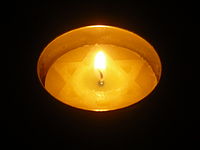UPDATES
Yom Hashoah – and possibly the last Nazi war crimes trial
April 16, 2015 | Sharyn Mittelman

Today is “Yom HaZikaron laShoah ve-laG’vurah“, meaning “Day of Remembrance of the Holocaust and Heroism”, a national memorial day in Israel to remember the six million Jewish victims murdered in the Holocaust, as well as those who fought against the Nazis.
In Israel, a siren is heard across the country and people wherever they are, stop what they are doing, whether driving a car, or walking in the street, to stand in silence and remember (see video of how a busy Israeli highway comes to a standstill).
Australia has the highest number of Holocaust survivors per capita, outside of Israel. Today many Australian Jews, myself included, will reflect upon the names and photographs of family members killed by the Nazis and their collaborators, as well as the unimaginable strength of the survivors, torn apart from their families, scarred by horrific memories, and often left to pick up the pieces and start again in a foreign land.
Across Australia there were a number of Holocaust commemorations. In Parliament House Canberra, there was a screening of the documentary “German Concentration Camps Factual Survey”, which was recorded as Allied troops marched into the Belsen camp 70 years ago (see my earlier blog post on background of this once forgotten film), and last night there were commemorations in cities including Melbourne and Sydney.
The duty to “never forget” remains, and perhaps is felt even more strongly, as many Holocaust survivors have now passed away, entrusting the next generation to tell their story. This responsibility also comes at a time of resurgent Holocaust denial and antisemitism (see here and here).
As Holocaust survivors pass away so do many of their former persecutors. However, next week in the German town of Lueneburg, Oskar Groening, known as “the accountant of Auschwitz,” will go on trial for charges relating to the 425,000 people sent to Auschwitz in occupied Poland between May and July 1944. Around 1.1 million people were murdered at Auschwitz, 90 percent of them Jews. It may be the last criminal trial of a Nazi for war crimes – after almost 70 years of efforts to achieve of a measure of justice in countries around the globe, with very mixed results.
Matthew Schofield in McClatchy DC provides background on Groening’s role in the Nazi SS at Auschwitz:
“From May 16 to July 11, 1944, he stood on the unloading ramps at Auschwitz as the Nazis’ Final Solution was applied to the Hungarian population. He watched as the healthy and strong were selected to be put to work. And he watched as the very young, the very old, the ill and the weak were moved directly to the gas chambers to be murdered.”
According to the BBC, fifty-five survivors and victims’ relatives are plaintiffs in the case, and many are likely to attend the trial. A statement from the prosecutors’ office said that Groeningthe was aware that those deemed unfit to work at the camp “were murdered directly after their arrival”.
Groening is 93 and is therefore unlikely to live much longer or serve any prison time if found guilty and sentenced. Some may therefore ask why go ahead with the trial?
There are at least two compelling reasons. Firstly, because symbolically there can be no statute of limitations on justice, and secondly because the trial provides further eye-witness testimony to the horrors of the Holocaust including the gas chambers and crematoria, therefore directly countering offensive Holocaust denial regarding gas chambers. It also places a spotlight on the way many ordinary Germans – who did not kill anyone directly – still played a passive or active role in the industry of mass-murder.
Groening, himself acknowledges witnessing the mass killing at Auschwitz. As Schofield writes:
“A decade ago in a BBC documentary, he claimed he’d done nothing more than ‘live in a garrison where the destruction of the Jews took place.’ But he also noted that in the last decades of his life he was deeply disturbed as it became clear that more and more people around the world were claiming the Holocaust was exaggerated or even fabricated. ‘I see it as my task, now at my age, to face up to these things that I experienced and to oppose the Holocaust deniers who claim that Auschwitz never happened,’ he said in the documentary. ‘I want to tell those deniers: I have seen the gas chambers, I have seen the crematoria, I have seen the burning pits – and I want you to believe me that these atrocities happened. I was there.'”
Sharyn Mittelman
Tags: Antisemitism





